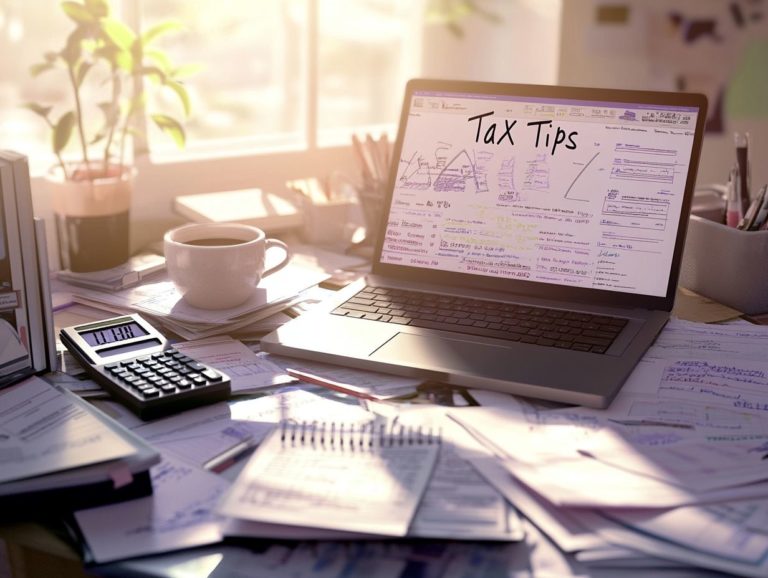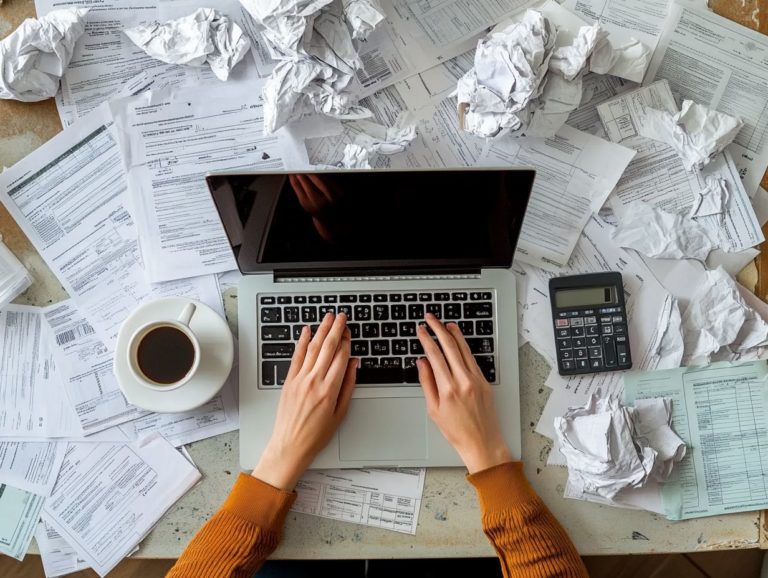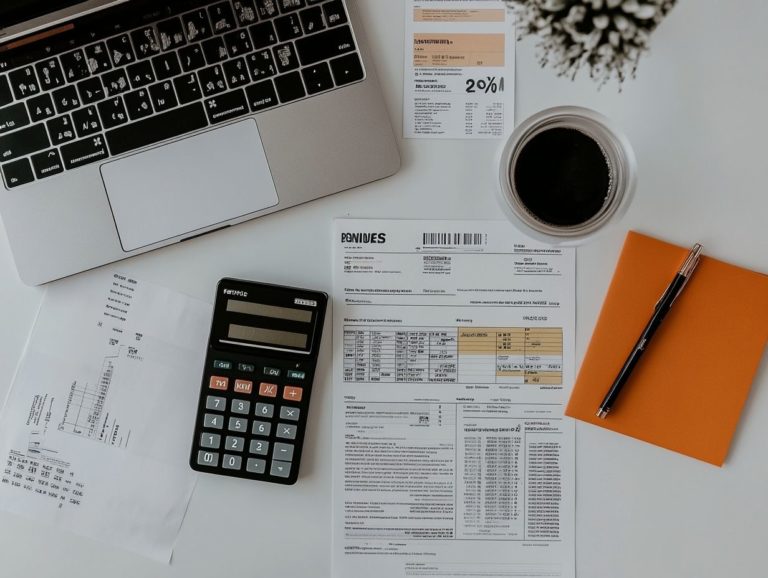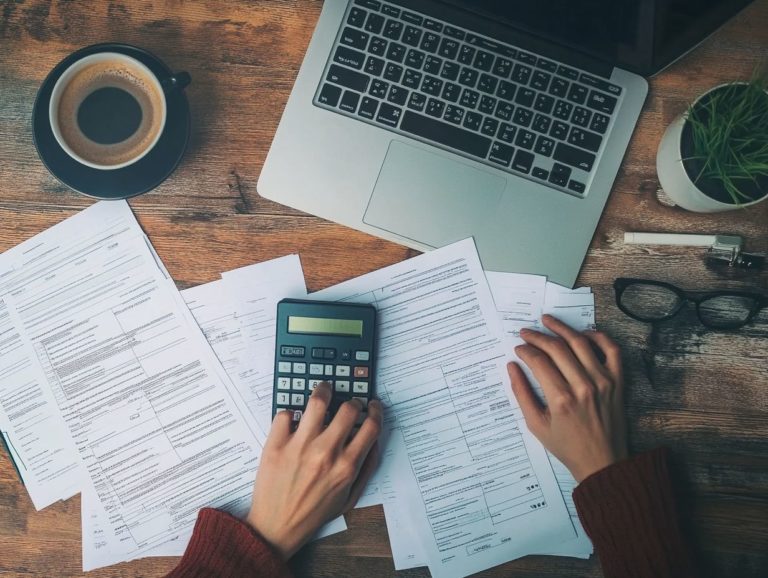Understanding Tax Deductions for Home Office Expenses
Navigating the realm of home office expenses can feel overwhelming. Deciphering what you can actually deduct on your taxes is crucial.
From direct costs like internet and utilities to indirect expenses, understanding these nuances can lead to significant savings. This guide breaks down the various types of home office expenses, outlines eligibility requirements, and provides methods for calculating your deductions.
It also highlights common pitfalls to avoid and offers strategies to maximize your savings. Whether you re a freelancer or working remotely, this resource helps you make the most of your home office deductions.
Contents
- Key Takeaways:
- Types of Home Office Expenses
- Eligibility for Home Office Deductions
- Calculating Home Office Deductions
- Common Mistakes to Avoid
- Tips for Maximizing Home Office Deductions
- Frequently Asked Questions
- What is a home office deduction?
- Am I eligible for a home office deduction?
- What expenses can I deduct for my home office?
- Can I deduct expenses for my entire home if I use a room as a home office?
- Are there any restrictions on home office deductions?
- Do I need to keep records for my home office expenses?
Key Takeaways:

- Understand the difference between direct and indirect expenses for home office deductions.
- Ensure you meet the eligibility requirements for claiming deductions on your home office expenses.
- Explore different methods for calculating home office deductions to find the best fit for your situation.
What are Home Office Expenses?
Home office expenses are costs associated with maintaining a dedicated workspace in your home. This includes deductible expenses like utilities, mortgage interest, and repairs.
When documented properly and claimed on your tax return, these expenses can significantly reduce your taxable income. This is especially beneficial for self-employed individuals and those managing a side hustle, as long as they meet the specific qualifications outlined by the IRS.
Beyond utilities and mortgage interest, you can include internet costs, office supplies, and even depreciation if your home office serves as your principal place of business. The IRS requires that this workspace be used regularly and exclusively for business activities to qualify for deductions. Understanding the distinctions between direct expenses, which directly benefit your home office, and indirect expenses, which can be allocated to the broader household, can enhance your financial advantage.
For additional insights, IRS Publication 587 provides essential guidelines to ensure compliance and help you maximize your deductions.
Types of Home Office Expenses
Understanding the various types of home office expenses is essential for maximizing your home office deduction. These expenses can be neatly divided into direct and indirect categories.
Direct expenses are those specifically related to the exclusive use of your home office. Indirect expenses encompass general business costs incurred during regular use. By grasping these distinctions, you can optimize your deductions and enhance your financial strategy.
Direct Expenses
Direct expenses are costs you can clearly attribute to your home office. This includes utilities, repairs, maintenance, and mortgage interest, provided you meet the exclusive use requirement.
It’s crucial to keep meticulous records of these expenses, as the IRS only permits deductions for amounts directly related to the business space. For example, if you spend $200 on a repair specifically for your home office, you can deduct that amount in full. However, if you make general repairs that affect the entire house, you will only be able to claim a portion of the deduction based on how much of your home is used for business.
To navigate this process effectively, consult IRS Publication 587, which offers a detailed overview of allowable expenses. This publication underscores the importance of differentiating between direct and indirect costs, enabling you to optimize your deductions while staying compliant.
Indirect Expenses
Indirect expenses pertain to the overall costs associated with maintaining your home. They must be thoughtfully divided between business and personal use. This allocation can significantly influence your home office deduction, especially when considering the square footage designated for business activities.
To accurately calculate these expenses, measure the total area of your home alongside the specific space utilized for business purposes. For instance, if your home office occupies 200 square feet within a 1,000 square foot home, you can allocate 20% of indirect costs like real estate taxes and utilities to your business.
When you file a Schedule C or other relevant tax forms, these allocations will directly impact your taxable income. Therefore, keeping accurate records is very important. For example, if your annual utility expenses amount to $1,200, then $240 would qualify as a legitimate business expense. This effectively reduces your taxable income and can potentially lower your overall tax liability.
Eligibility for Home Office Deductions

Your eligibility for home office deductions depends on meeting specific qualifications outlined by the IRS. One key requirement is the exclusive use criterion, which stipulates that a designated portion of your home must be used solely for business purposes.
This criterion particularly applies to self-employed individuals and those filing a Schedule C on their tax returns.
Requirements for Claiming Deductions
To claim home office deductions, you must adhere to specific IRS requirements. The space needs to be used regularly and exclusively for business purposes. This sets apart self-employed individuals from employees claiming business expenses.
For self-employed individuals, it s crucial to track documentation and expenses meticulously. This involves necessary forms like Schedule C and Form 8829. Employees may find it trickier to qualify for these deductions due to the 2% adjusted gross income threshold that applies to them.
Stay ahead of the game! Keep an eye on any changes in IRS regulations affecting deduction eligibility. As rules can evolve, it s wise to consult current resources or engage a tax professional to help navigate this financial advantage.
Calculating Home Office Deductions
You can calculate your home office deductions using two primary methods. The first is the actual expense method, which requires meticulous tracking of all business-related expenses.
The second is the simplified method, a more straightforward approach offering a flat-rate deduction based on the square footage of your workspace.
Methods for Calculating Deductions
The methods for calculating home office deductions the actual expense method and the simplified method each have distinct advantages and disadvantages tailored to various types of home-based businesses and self-employed individuals.
When weighing these approaches, consider your business’s specific needs and your financial situation. The actual expense method allows for a detailed calculation of all home office-related expenses, such as utilities, repairs, and depreciation. This method is particularly beneficial for those with significant overhead costs.
Conversely, the simplified method provides a flat-rate deduction, allowing for ease of use and minimal record-keeping, ideal for smaller operations.
Both methods carry their own tax implications. The actual expense method might yield larger deductions but demands careful documentation. On the other hand, the simplified method limits your potential deductions yet streamlines the process. Understanding these nuances can significantly influence your tax liability and overall financial planning.
Common Mistakes to Avoid
Be aware that common mistakes when claiming home office deductions can have significant tax implications. These may include underreporting or overreporting expenses, failing to meet the exclusive use requirement, or misallocating on your tax filings.
Such errors can jeopardize your potential deductions. Therefore, it s crucial to approach this process with diligence and precision.
Potential Errors and How to Avoid Them

When claiming home office deductions, you may encounter potential pitfalls, such as miscalculating eligible expenses, misunderstanding IRS requirements, or neglecting to maintain proper documentation. These errors can lead to unfavorable tax implications when you file your return.
To avoid these complications, it’s crucial to meticulously track every relevant expense, including utilities and internet costs. Make sure to only claim the portion that pertains to your home office. Familiarizing yourself with various methods of calculating deductions like the simplified expense method can significantly simplify the process.
Keeping organized records is key. Leveraging digital tools can help you preserve invoices and receipts, making it easier to substantiate your claims if they’re ever questioned.
Regularly reviewing IRS guidelines is essential to stay informed about any changes that could impact your eligibility. This helps mitigate the risk of costly mistakes when tax season rolls around.
Tips for Maximizing Home Office Deductions
To maximize your home office deductions, engage in smart planning and develop a thorough understanding of the allowable tax breaks. Identify which business-related expenses are eligible and recognize the differences between how self-employed individuals and employees can claim deductions, like the actual expense method or the simplified method for reporting these deductions. The actual expense method allows you to deduct the actual costs of running your home office, while the simplified method provides a flat rate deduction.
This knowledge can help you save a lot on taxes!
Strategies for Getting the Most out of Deductions
Implementing effective strategies to maximize your deductions can lead to substantial savings on your federal income tax. Identify all potential home office write-offs and ensure that every aspect of your business location and usage is accurately reported, particularly the exclusive use of the designated space for business activities.
Recognize that many individuals overlook various deductible expenses that could significantly lessen their tax burden. For instance, costs related to business travel, meals, and certain educational courses often qualify as deductions. Expenses such as mortgage interest, utilities, and repairs and maintenance can be significant components of your home office expenses.
Maintaining thorough records of these expenditures, such as receipts and invoices, simplifies accurate reporting and brings clarity during audits. Consulting with tax professionals can provide tailored advice and insights into best practices, ensuring that no potential deductions slip through the cracks. They can help you understand the tax implications of using part of your home for daycare services or for rental use.
These experts can guide you through the complexities of tax laws, including the details of IRS Publication 587, enabling you to make informed financial decisions.
Frequently Asked Questions
What is a home office deduction?
A home office deduction is a tax deduction that allows individuals who use a portion of their home for business purposes to deduct certain expenses related to that use from their taxable income. This includes understanding the qualifications needed to establish a principal place of business and meeting the exclusive use requirement.
Am I eligible for a home office deduction?

You may be eligible for a home office deduction if you use a part of your home regularly and only for business. It should be your main place of business or where you meet clients.
What expenses can I deduct for my home office?
You can deduct expenses like rent, mortgage interest, utilities, insurance, and maintenance for the space used for business. You might also deduct depreciation on your home’s value.
Can I deduct expenses for my entire home if I use a room as a home office?
No, you can only deduct expenses for the part of your home that s used regularly and just for business. You can claim a dedicated room or even just a part of a room!
Are there any restrictions on home office deductions?
There are restrictions for home office deductions. You can’t claim deductions for parts of your home used for personal stuff, and your deductions can t be more than your business income.
Do I need to keep records for my home office expenses?
Keeping detailed records of all expenses related to your home office is crucial. Save receipts, invoices, and any other documents to support your deduction if the Internal Revenue Service audits you!






